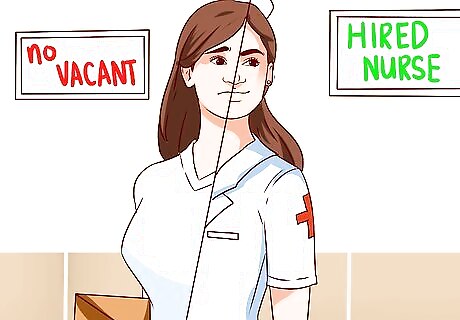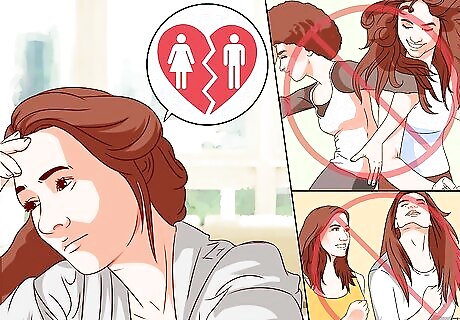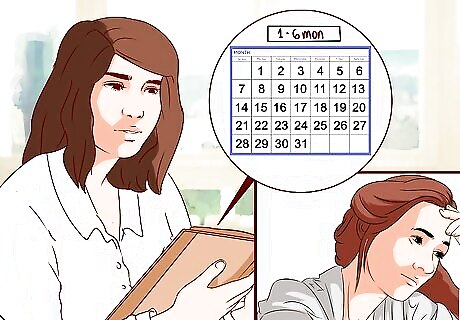
views
Coping With Change

Acknowledge your feelings. If you feel resistant to change or uncomfortable with impending change, then it is important to acknowledge your feelings. Don’t avoid your emotions, listen to them. Emotions are part of self-awareness. When you acknowledge an emotion, you accept it as if to say, “this isn’t so bad” and allow yourself to understand it and manage it. Often, change brings up feelings of anxiety such as worry and fear. It’s okay to feel worried and feel fear. Grieve and take care of your feelings. Even if the big change in your life is a happy one like getting married or moving to a place you always wanted to live, accept that there will be some emotional losses and work through them. Try to identify the feelings you are having and why by writing or saying them out loud. For example, you might write or say something like, “I am feeling anxious and overwhelmed because I have to move to a new city next week.”

Prepare yourself. No matter what sort of change you are facing, you can take steps to prepare yourself for the new situation. Think about what your new situation will be and then identify some ways that you can learn more about what you will be facing. For example, if you plan to move to another city, state, or country, learn as much as you can about the new place before going. If you are starting a new job, find out as much as you can about what you will be doing. Try to create a plan for how you will approach the new situation. For example, if you are moving to a new city, you might ask: what restaurants do you want to check out? How will you get around the city? What other places would you like to explore? You can also make a plan to change your situation if it is not where you want to be in life. For example, you might not like your new job, so you could create a plan to find a new one that you will enjoy by searching the job listings, applying for jobs that interest you, and attending job fairs.

Create a mental script. If you are facing a life change that you cannot control, then it may be hard to accept the situation. However, you can work towards acceptance by reassuring yourself in the form of an accepting mental script. For example, when you are feeling upset or anxious about the oncoming change, you might repeat to yourself, “I do not like the change that is happening, but it is beyond my power to control. I may not like this change, but I will accept it and try to make the best of it.”

Remind yourself that you control your attitude and actions. Change may turn your world upside down but you still have control over how you respond to the situation. You can choose to approach the situation with anger and take your feelings out on other people, or you can choose to see the situation as a new opportunity and approach it with excitement. Some people find list-making to be an effective way to reduce anxiety and feel happier. If you are feeling miserable about the situation, try writing down a list of positives. For example, if you have just gone through a breakup, then you might identify the positives as things like more free time, a chance to get to know yourself better, and more time to spend with your friends and family.
Decreasing Anxiety Around Change

Journal about your worries. Change can bring about lots of insecurities, worries, and negative thoughts. Especially if you feel overwhelmed by change, start writing down all the things that contribute to you feeling overwhelmed. Writing it down can help you realize that things are less negative than you imagine. If you feel overwhelmed by having a puppy and are having a difficult time adjusting to all the changes, write down what has changed in your life and what is difficult about it. Write down possible solutions to your issue, such as creating a schedule to help you manage the changes.

Talk to others with similar experiences. It can be comforting to talk to someone who’s going through a similar change as you. Maybe you are starting college, having a baby, or changing careers. Talking to someone who’s “been there” can be comforting, knowing that he or she got through it okay. Ask for advice on what you can do to get through the change well. If you’re going through a divorce, meet with other people who are experiencing the same thing, or have already gone through it.

Accept uncertainty. If you worry about all the changes happening around you, you lose your ability to enjoy the moments and experience them in their fullness. Constantly worrying doesn’t make you any more capable of predicting the future or handling it any better. Accept that you are in a transition and that change is inevitable. You can say, “I accept that change is occurring, and it’s up to me how I handle it.”

Relax. Relaxation can help decrease stress and increase emotional health. Techniques such as meditation, deep breathing, and progressive muscle relaxation can help you relax and cope with stress more effectively. Practice progressive muscle relaxation by getting comfortable and starting to relax your body and your breathing. Now, tense your right fist for a few seconds, then release. Move up to your right forearm, tense and release. Move to your right shoulder, then do the same for your left arm. Continue throughout your body, including your neck, back, face, chest, hips, quads, calves, ankles, feet, and toes.

Exercise. Exercise helps cope with stress and reduce anxiety. Do your body, mind, and emotions a favor by engaging in some activity. Aim to exercise for 30 minutes each day on most days. Take the dog for a walk, bike to groceries, or go for an evening hike after work. You can also exercise by dancing or running, or going to the gym.
Allowing Time to Adjust

Expect new patterns of living to take time. Change is a shock because it destabilizes the life you've made for yourself to this point. All habits and routines are up for questioning when change interferes, so going slowly and easing yourself into the new is an essential strategy for coping. Expect that any change will take time to adjust to; be realistic when enduring big life changes. Give yourself time to recoup. For example, if you're grieving after a death, be it a person or a pet, acknowledge that how you grieve and how long you grieve for are decisions only you can make. Nobody else can rush you, no matter what they insist.

See change as opportunity. Change is an opportunity to re-examine the life you've been leading to see whether you've been making positive choices or paying too much (time, money, effort) for leading a lifestyle that isn't bringing you happiness. Although sometimes painful, change can bring a silver lining. Learn to enjoy the process of change by creating positive reinforcements around change. This can include treating yourself to ice cream after you finish physical therapy for your injury, or getting to spend a small amount of money each time you save up $100.

Leave complaining and blaming behind you. When a change thrusts you into constant complaining and blaming, it can be understandable for a short period of time. Friends and family will rally at the beginning of a misfortune. It’s important to keep a positive outlook when in the midst of change to help decrease stress and cope with difficulties. Find ways to see things in a positive light. If you struggle to find positive things, ask someone to help you look for them. Remember, changes can often provide opportunities for future endeavors that previously would not have been attainable.

Let go of what has happened and move on. Focusing on the past will not help you to move on with your life. It’s no use wanting your ‘old life’ back or spending all of your moments wishing things would go back to what they used to be. Instead of focusing on the past, anchor yourself in the future by creating excitement and things to look forward to doing. Try something that you’ve never done before like taking a painting class, going ice skating, or visiting a new city. If you still find yourself dwelling on the past and it is interfering with your life, then you may want to seek the help of a therapist to help you move forward in your life.
Identifying Adjustment Disorder

Think about your situation. Adjustment disorder develops within three months after you experience a stressful change. The change might be something positive or negative that caused significant stress in your life, such as moving, getting married, losing your job, or losing a family member.

Consider your symptoms. Those with adjustment disorder will exhibit some psychological symptoms that may help a mental health professional make a diagnosis. Symptoms include: Severe stress. Someone with adjustment disorder will have stress that is more intense than what you would expect someone to feel in that situation. For example, someone who has just bought a new home, might feel severely stressed even after they have closed on the house and moved in. Difficulty functioning. People with adjustment disorder may have a hard time functioning in social, professional, or academic settings. For example, someone who has recently gone through a breakup may be incapable of having a conversation with friends.

Reflect on the length of symptoms. Symptoms from adjustment disorder will not last longer than six months. If your symptoms last longer than six months, then you do not have adjustment disorder. You may have another mental health condition that is causing you to feel the way that you do.

See a therapist. If you think that you may have adjustment disorder, then you will need to see a therapist for a professional diagnosis and to get help. Even if you are not sure about whether or not adjustment disorder is to blame for the way you feel, seeing a therapist can help to get to the root of the problem.




















Comments
0 comment